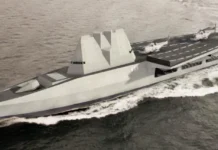
The Admiral’s Bookshelf. Admiral James G. Stavridis USN (Ret). Naval Institute Press 2025
Reviewed by Desmond Woods
This enjoyable and illuminating book is the third and final title in the series. The first was The Sailor’s Bookshelf: Fifty Books to Know the Sea, the second was The Leader’s Bookshelf.
The Admiral’s Bookshelf is both a guide to books that have been influential in the author’s career, and an introduction to his thoughts on leadership, the mentoring of the young and the requirement to be an ‘adult in the room’ and accept responsibility for the consequences of one’s own decisions and the actions of others.
Admiral James Stavridis believes that “good leaders are good readers.” His selection of literature highlights the lifetime of reading and reflection which has enhanced his career and helped him to become a successful commander at the highest level – Supreme Commander of NATO.
He has selected twenty five books for which he provides a synopsis and his interpretation of each book’s content. His thinking on the nature of morality and leadership are revealed through characters as diverse as Harry Flashman, Odysseus, Dwight Eisenhower, Chester Nimitz, Atticus Finch, Don Quixote, the Godfather, Colin Powell, Steve Jobs, Captain Queeg and the Old Man and the Sea.
He finds in Barbara Tuchman’s The Guns of August, which Kennedy read during the Cuban Missile Crisis, a study of the events and reactions which sparked the conflagration of the Great War. It is a sobering reminder of how minor events, which are apparently unconnected, can combine into a catastrophe, if the settings for war and the wrong personalities, are all in place. He writes of Tuchman’s masterpiece, “Her recurring theme is simple, if chilling: miscalculation, faulty communication, false narratives and plain stupidity, coupled with wilful obstinance can cause millions of deaths.”
In many of these books the question of decency, generosity, humility, conscientiousness, persistence and courage are the central themes. The author uses both fiction and non fiction to make his points. So, George McDonald Fraser’s despicable scoundrel Flashman is undoubtedly the lowest form of military life, but he does have the ability to think outside of conventions to achieve his nefarious ends by cunning, guile and clever use of new technology.
In a chapter called the Art of Delegation, Chester Nimitz’ biographer is shown trusting his subordinate Raymond Spruance to achieve the battle plan at Midway, which they had jointly developed based on outstanding use of cutting edge codebreaking. Spruance achieved a sufficient victory and then knew when to withdraw rather than risk his carriers and people in unnecessary further operations.
Great commanders delegate everything that needs to be done by those implementing the operation, except ultimate responsibility for failure. Eisenhower’s book Crusade in Europe revealed how he prepared a despatch, in case D Day failed, in which he took sole responsibility for the disaster on the Normandy beaches.
The author was issued with a copy of Sun Tzu’s the Art of War on his first day at the US Naval Academy and has used it throughout his stellar military career, both in the field as the NATO Commander in Afghanistan 2009 – 2013, and in his battles within the Pentagon. He attributes the ultimate ignominious failure of the US in Afghanistan to the fact that, as Sun says, “if you know yourself, but not the enemy, for every victory gained you will also suffer a defeat.”
The author knew General Colin Powell well and was mentored by him over many years. He recommends his book on leadership titled, It Worked For Me. He reminds the reader of the Powell Doctrine, which “limits military response unless such action would enjoy sincere support of the American people, has overwhelming support at hand, and satisfies a core U.S. interest.” On a personal level one of Powell’s principles of leadership was, “ avoid having your ego so close to your position, that when your position falls your ego goes with it.” Sage advice for Commanders-in-Chief, both civil and military, considering their plan of operations and their reputation.
Admiral Stavridis has a PhD in international relations. He is fluent in several languages, and has written fifteen books, both fiction and non fiction. After his years leading NATO and US Southern Command, he was the Dean of Fletcher School of Law and Diplomacy. He is the Chair Emeritus of the US Naval Institute Board and is the Chair of the Rockefeller Foundation. He is one of the most literate and well educated senior officers of his generation, or any other. As a result of reading and enjoying this insightful book I plan to seek out the earlier two volumes and to read other works by this thoughtful retired USN four-star officer.
This book of 209 pages is recommended as a case study in how to read widely, and profit from doing so, all through a career and in life generally. Anyone seeking to become a better leader – or a better reader – will find the Admiral’s Bookshelf a good guide to what could be on their list of books from which they can built their personal and professional store of intellectual capital.



